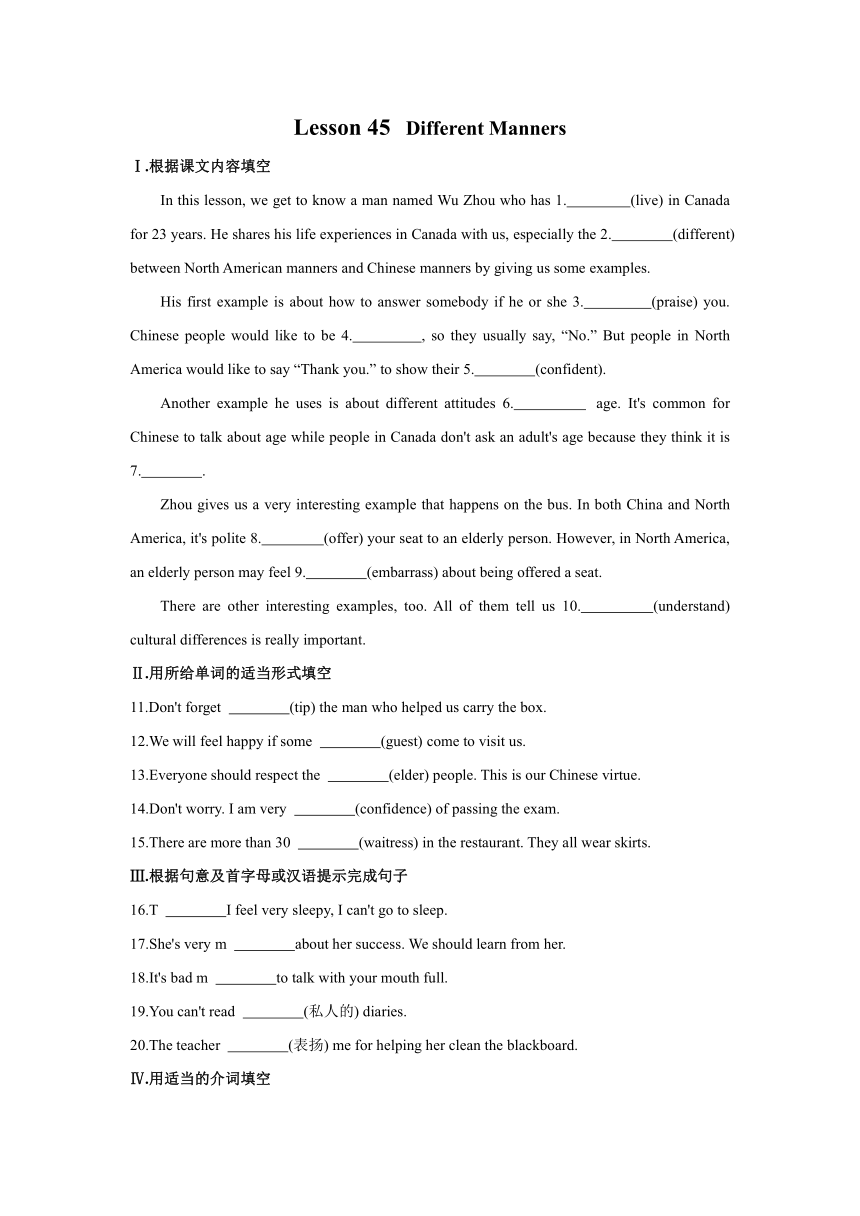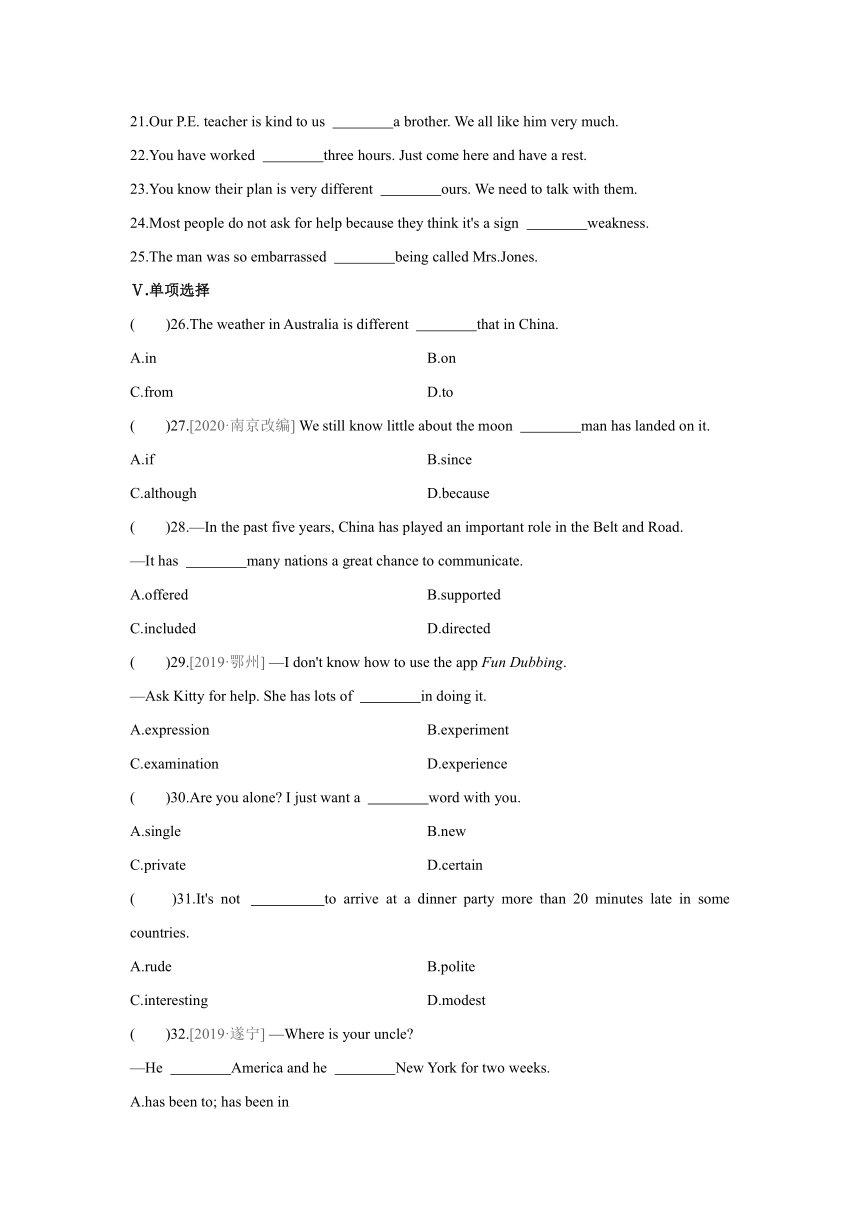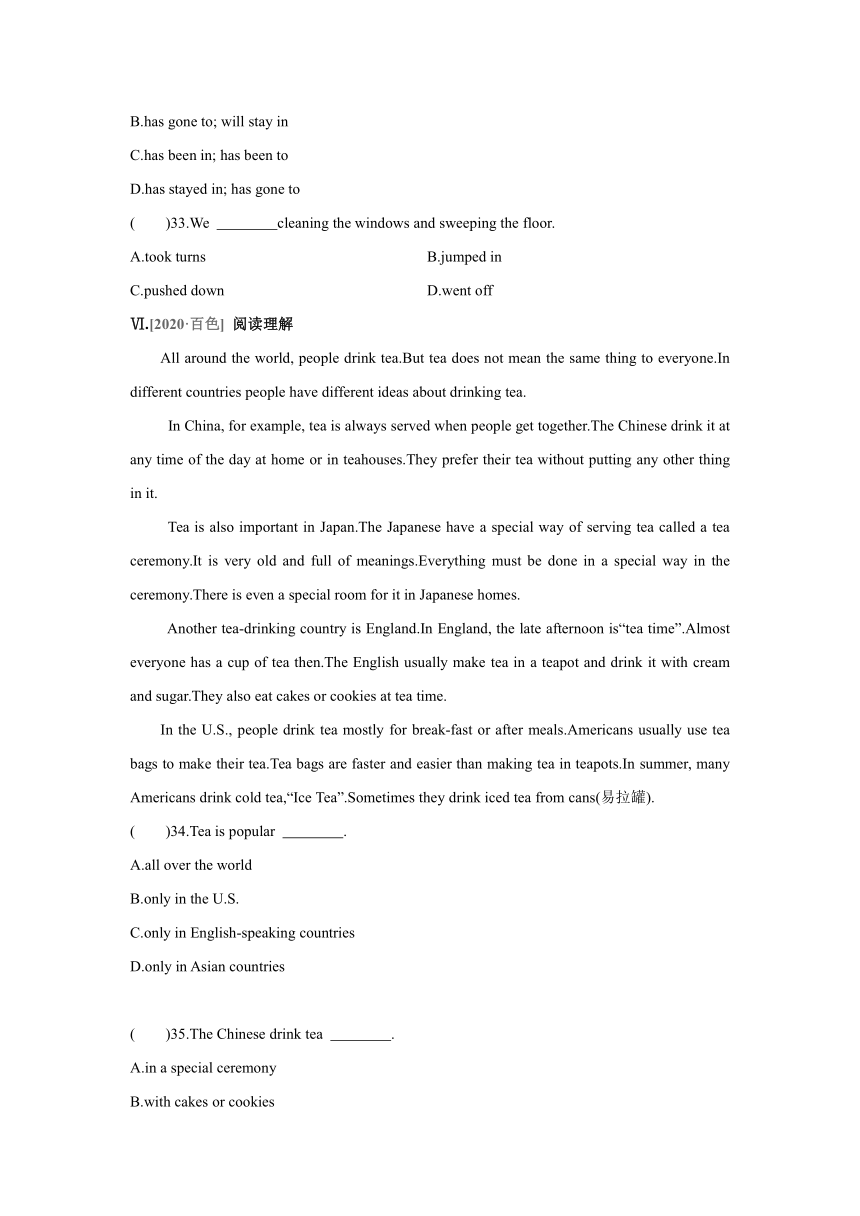冀教版英语九年级下同步课时练习:Unit 8 Culture Shapes Us Lesson 45 Different Manners(含答案)
文档属性
| 名称 | 冀教版英语九年级下同步课时练习:Unit 8 Culture Shapes Us Lesson 45 Different Manners(含答案) |

|
|
| 格式 | docx | ||
| 文件大小 | 42.5KB | ||
| 资源类型 | 教案 | ||
| 版本资源 | 冀教版 | ||
| 科目 | 英语 | ||
| 更新时间 | 2022-03-31 22:08:37 | ||
图片预览



文档简介
Lesson 45 Different Manners
Ⅰ.根据课文内容填空
In this lesson, we get to know a man named Wu Zhou who has 1. (live) in Canada for 23 years. He shares his life experiences in Canada with us, especially the 2. (different) between North American manners and Chinese manners by giving us some examples.
His first example is about how to answer somebody if he or she 3. (praise) you. Chinese people would like to be 4. , so they usually say, “No.” But people in North America would like to say “Thank you.” to show their 5. (confident).
Another example he uses is about different attitudes 6. age. It's common for Chinese to talk about age while people in Canada don't ask an adult's age because they think it is 7. .
Zhou gives us a very interesting example that happens on the bus. In both China and North America, it's polite 8. (offer) your seat to an elderly person. However, in North America, an elderly person may feel 9. (embarrass) about being offered a seat.
There are other interesting examples, too. All of them tell us 10. (understand) cultural differences is really important.
Ⅱ.用所给单词的适当形式填空
11.Don't forget (tip) the man who helped us carry the box.
12.We will feel happy if some (guest) come to visit us.
13.Everyone should respect the (elder) people. This is our Chinese virtue.
14.Don't worry. I am very (confidence) of passing the exam.
15.There are more than 30 (waitress) in the restaurant. They all wear skirts.
Ⅲ.根据句意及首字母或汉语提示完成句子
16.T I feel very sleepy, I can't go to sleep.
17.She's very m about her success. We should learn from her.
18.It's bad m to talk with your mouth full.
19.You can't read (私人的) diaries.
20.The teacher (表扬) me for helping her clean the blackboard.
Ⅳ.用适当的介词填空
21.Our P.E. teacher is kind to us a brother. We all like him very much.
22.You have worked three hours. Just come here and have a rest.
23.You know their plan is very different ours. We need to talk with them.
24.Most people do not ask for help because they think it's a sign weakness.
25.The man was so embarrassed being called Mrs.Jones.
Ⅴ.单项选择
( )26.The weather in Australia is different that in China.
A.in B.on
C.from D.to
( )27.[2020·南京改编] We still know little about the moon man has landed on it.
A.if B.since
C.although D.because
( )28.—In the past five years, China has played an important role in the Belt and Road.
—It has many nations a great chance to communicate.
A.offered B.supported
C.included D.directed
( )29.[2019·鄂州] —I don't know how to use the app Fun Dubbing.
—Ask Kitty for help. She has lots of in doing it.
A.expression B.experiment
C.examination D.experience
( )30.Are you alone I just want a word with you.
A.single B.new
C.private D.certain
( )31.It's not to arrive at a dinner party more than 20 minutes late in some countries.
A.rude B.polite
C.interesting D.modest
( )32.[2019·遂宁] —Where is your uncle
—He America and he New York for two weeks.
A.has been to; has been in
B.has gone to; will stay in
C.has been in; has been to
D.has stayed in; has gone to
( )33.We cleaning the windows and sweeping the floor.
A.took turns B.jumped in
C.pushed down D.went off
Ⅵ.[2020·百色] 阅读理解
All around the world, people drink tea.But tea does not mean the same thing to everyone.In different countries people have different ideas about drinking tea.
In China, for example, tea is always served when people get together.The Chinese drink it at any time of the day at home or in teahouses.They prefer their tea without putting any other thing in it.
Tea is also important in Japan.The Japanese have a special way of serving tea called a tea ceremony.It is very old and full of meanings.Everything must be done in a special way in the ceremony.There is even a special room for it in Japanese homes.
Another tea-drinking country is England.In England, the late afternoon is“tea time”.Almost everyone has a cup of tea then.The English usually make tea in a teapot and drink it with cream and sugar.They also eat cakes or cookies at tea time.
In the U.S., people drink tea mostly for break-fast or after meals.Americans usually use tea bags to make their tea.Tea bags are faster and easier than making tea in teapots.In summer, many Americans drink cold tea,“Ice Tea”.Sometimes they drink iced tea from cans(易拉罐).
( )34.Tea is popular .
A.all over the world
B.only in the U.S.
C.only in English-speaking countries
D.only in Asian countries
( )35.The Chinese drink tea .
A.in a special ceremony
B.with cakes or cookies
C.when they get together
D.from cans in teahouses
( )36.The English like to .
A.drink tea without anything in it
B.drink tea with cream and sugar
C.drink tea for breakfast
D.drink tea in a special room
( )37.“Ice Tea” is popular .
A.in winter B.in England
C.in late afternoons D.in the U.S.
( )38.The passage is about .
A.Chinese tea
B.the importance of tea
C.the tea time in England
D.different ways of drinking tea in different countries
Ⅶ.任务型阅读
If a person behaves politely and is helpful to others, we say that he or she has good manners. Everyone likes a person with good manners. What are good manners Here are some examples.
When waiting for a bus or in a post office,he waits in line and does not cut in line. On the bus, he always gives his seat to an old person or a lady with a baby. He does not talk or laugh loudly in public. When eating, he doesn't speak with his mouth full.
Different countries have different manners. Before going into a house in Japan, it is good manners to take off your shoes. In European countries, even though shoes sometimes are very dirty, this is not done. A guest in a Chinese house never finishes a drink. He leaves a little to show that he has had enough. While in England, a guest always finishes it to show that he has enjoyed it.
39题完成句子;40、41题简略回答问题;42题找出并写下最后一段的主题句;43题将文中画线句子译成汉语。
39.If a person behaves and is helpful to others, we say that he or she has good manners.
40.How many kinds of good manners are mentioned in Paragraph 2
41.What is good manners before going into a house in Japan
42.
43.
Lesson 45 Different Manners
Ⅰ.1.lived 2.differences 3.praises 4.modest 5.confidence 6.towards
7.impolite/private 8.to offer 9.embarrassed 10.understanding
Ⅱ.11.to tip 12.guests 13.elderly 14.confident 15.waitresses
Ⅲ.16.Though 17.modest 18.manners 19.private 20.praised
Ⅳ.21.like 22.for 23.from 24.of 25.about
Ⅴ.26.C 27.C
28.A
29.D 30.C 31.B 32.B 33.A
Ⅵ.34.A 35.C 36.B 37.D
38.D
Ⅶ.39.politely
40.Four./4./Four kinds of good manners are mentioned in Paragraph 2.
41.Taking off your shoes.
42.Different countries have different manners.
43.在中国家庭(做客)的客人从不喝完饮料。
Ⅰ.根据课文内容填空
In this lesson, we get to know a man named Wu Zhou who has 1. (live) in Canada for 23 years. He shares his life experiences in Canada with us, especially the 2. (different) between North American manners and Chinese manners by giving us some examples.
His first example is about how to answer somebody if he or she 3. (praise) you. Chinese people would like to be 4. , so they usually say, “No.” But people in North America would like to say “Thank you.” to show their 5. (confident).
Another example he uses is about different attitudes 6. age. It's common for Chinese to talk about age while people in Canada don't ask an adult's age because they think it is 7. .
Zhou gives us a very interesting example that happens on the bus. In both China and North America, it's polite 8. (offer) your seat to an elderly person. However, in North America, an elderly person may feel 9. (embarrass) about being offered a seat.
There are other interesting examples, too. All of them tell us 10. (understand) cultural differences is really important.
Ⅱ.用所给单词的适当形式填空
11.Don't forget (tip) the man who helped us carry the box.
12.We will feel happy if some (guest) come to visit us.
13.Everyone should respect the (elder) people. This is our Chinese virtue.
14.Don't worry. I am very (confidence) of passing the exam.
15.There are more than 30 (waitress) in the restaurant. They all wear skirts.
Ⅲ.根据句意及首字母或汉语提示完成句子
16.T I feel very sleepy, I can't go to sleep.
17.She's very m about her success. We should learn from her.
18.It's bad m to talk with your mouth full.
19.You can't read (私人的) diaries.
20.The teacher (表扬) me for helping her clean the blackboard.
Ⅳ.用适当的介词填空
21.Our P.E. teacher is kind to us a brother. We all like him very much.
22.You have worked three hours. Just come here and have a rest.
23.You know their plan is very different ours. We need to talk with them.
24.Most people do not ask for help because they think it's a sign weakness.
25.The man was so embarrassed being called Mrs.Jones.
Ⅴ.单项选择
( )26.The weather in Australia is different that in China.
A.in B.on
C.from D.to
( )27.[2020·南京改编] We still know little about the moon man has landed on it.
A.if B.since
C.although D.because
( )28.—In the past five years, China has played an important role in the Belt and Road.
—It has many nations a great chance to communicate.
A.offered B.supported
C.included D.directed
( )29.[2019·鄂州] —I don't know how to use the app Fun Dubbing.
—Ask Kitty for help. She has lots of in doing it.
A.expression B.experiment
C.examination D.experience
( )30.Are you alone I just want a word with you.
A.single B.new
C.private D.certain
( )31.It's not to arrive at a dinner party more than 20 minutes late in some countries.
A.rude B.polite
C.interesting D.modest
( )32.[2019·遂宁] —Where is your uncle
—He America and he New York for two weeks.
A.has been to; has been in
B.has gone to; will stay in
C.has been in; has been to
D.has stayed in; has gone to
( )33.We cleaning the windows and sweeping the floor.
A.took turns B.jumped in
C.pushed down D.went off
Ⅵ.[2020·百色] 阅读理解
All around the world, people drink tea.But tea does not mean the same thing to everyone.In different countries people have different ideas about drinking tea.
In China, for example, tea is always served when people get together.The Chinese drink it at any time of the day at home or in teahouses.They prefer their tea without putting any other thing in it.
Tea is also important in Japan.The Japanese have a special way of serving tea called a tea ceremony.It is very old and full of meanings.Everything must be done in a special way in the ceremony.There is even a special room for it in Japanese homes.
Another tea-drinking country is England.In England, the late afternoon is“tea time”.Almost everyone has a cup of tea then.The English usually make tea in a teapot and drink it with cream and sugar.They also eat cakes or cookies at tea time.
In the U.S., people drink tea mostly for break-fast or after meals.Americans usually use tea bags to make their tea.Tea bags are faster and easier than making tea in teapots.In summer, many Americans drink cold tea,“Ice Tea”.Sometimes they drink iced tea from cans(易拉罐).
( )34.Tea is popular .
A.all over the world
B.only in the U.S.
C.only in English-speaking countries
D.only in Asian countries
( )35.The Chinese drink tea .
A.in a special ceremony
B.with cakes or cookies
C.when they get together
D.from cans in teahouses
( )36.The English like to .
A.drink tea without anything in it
B.drink tea with cream and sugar
C.drink tea for breakfast
D.drink tea in a special room
( )37.“Ice Tea” is popular .
A.in winter B.in England
C.in late afternoons D.in the U.S.
( )38.The passage is about .
A.Chinese tea
B.the importance of tea
C.the tea time in England
D.different ways of drinking tea in different countries
Ⅶ.任务型阅读
If a person behaves politely and is helpful to others, we say that he or she has good manners. Everyone likes a person with good manners. What are good manners Here are some examples.
When waiting for a bus or in a post office,he waits in line and does not cut in line. On the bus, he always gives his seat to an old person or a lady with a baby. He does not talk or laugh loudly in public. When eating, he doesn't speak with his mouth full.
Different countries have different manners. Before going into a house in Japan, it is good manners to take off your shoes. In European countries, even though shoes sometimes are very dirty, this is not done. A guest in a Chinese house never finishes a drink. He leaves a little to show that he has had enough. While in England, a guest always finishes it to show that he has enjoyed it.
39题完成句子;40、41题简略回答问题;42题找出并写下最后一段的主题句;43题将文中画线句子译成汉语。
39.If a person behaves and is helpful to others, we say that he or she has good manners.
40.How many kinds of good manners are mentioned in Paragraph 2
41.What is good manners before going into a house in Japan
42.
43.
Lesson 45 Different Manners
Ⅰ.1.lived 2.differences 3.praises 4.modest 5.confidence 6.towards
7.impolite/private 8.to offer 9.embarrassed 10.understanding
Ⅱ.11.to tip 12.guests 13.elderly 14.confident 15.waitresses
Ⅲ.16.Though 17.modest 18.manners 19.private 20.praised
Ⅳ.21.like 22.for 23.from 24.of 25.about
Ⅴ.26.C 27.C
28.A
29.D 30.C 31.B 32.B 33.A
Ⅵ.34.A 35.C 36.B 37.D
38.D
Ⅶ.39.politely
40.Four./4./Four kinds of good manners are mentioned in Paragraph 2.
41.Taking off your shoes.
42.Different countries have different manners.
43.在中国家庭(做客)的客人从不喝完饮料。
同课章节目录
- Unit 7 Work for Peace
- Lesson 37 Don't Fight!
- Lesson 38 Making School a Better Place
- Lesson 39 The Dove and the Olive Branch
- Lesson 40 The UN—Power of Words
- Lesson 41 Jenny's Good Advice
- Lesson 42 Peace at Last
- Unit Review
- Unit 8 Culture Shapes Us
- Lesson 43 A Visit to Chinatown
- Lesson 44 Popular Sayings
- Lesson 45 Different Manners
- Lesson 46 Home to Many Cultures
- Lesson 47 Good Manners
- Lesson 48 Supper with the Bradshaws
- Unit Review
- Unit 9 Communication
- Lesson 49 Get Along with Others
- Lesson 50 Tips for Good Communication
- Lesson 51 What Could Be Wrong?
- Lesson 52 The Power of a Smile
- Lesson 53 Working in Groups
- Lesson 54 How Embarrassing!
- Unit Review
- Unit 10 Get Ready for the Future
- Lesson 55 Look into the Future
- Lesson 56 Manage Your Time
- Lesson 57 Best Wishes
- Lesson 58 Ms.Liu's Speech
- Lesson 59 Keep Your Choices Open
- Lesson 60 Get a Good Education
- Unit Review
